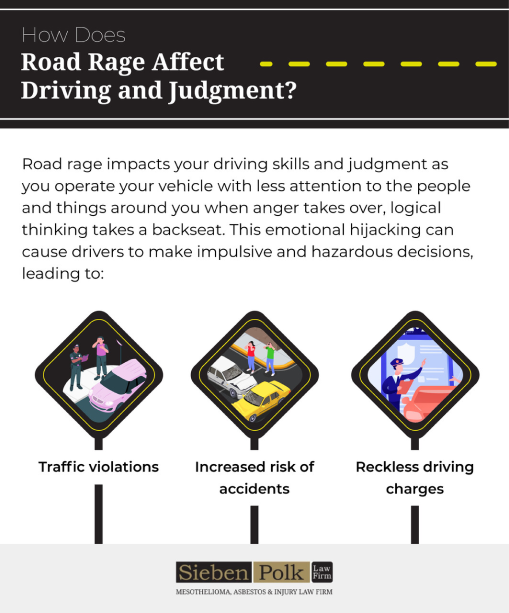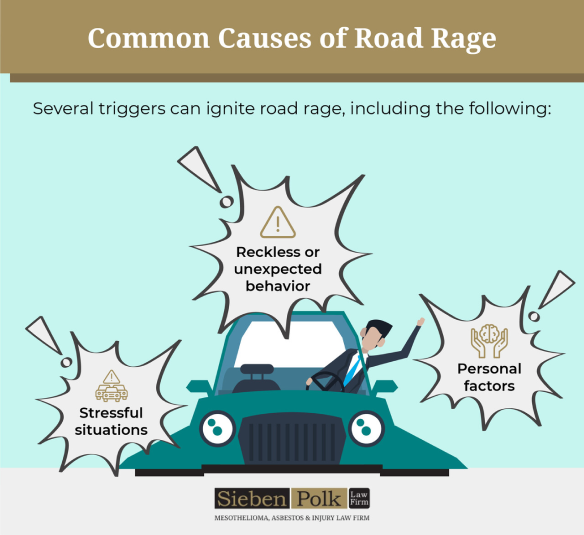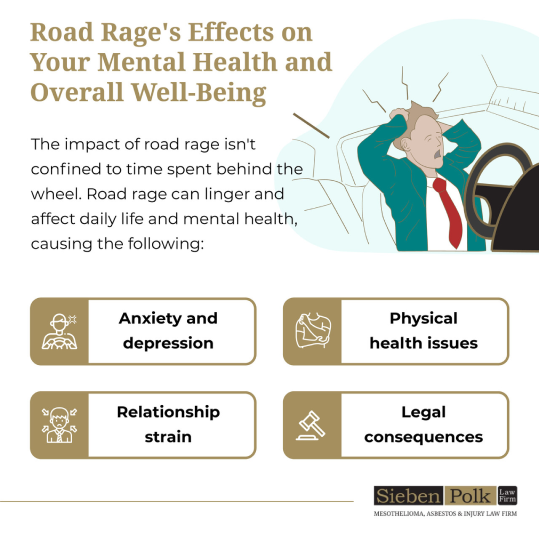Understanding Road Rage: How To Manage Your Own Emotions on the Road and Deal With Others
Road rage affects all drivers across the United States. Unfortunately, it can result in severe—even deadly— car accidents and incidents. This comprehensive guide explores road rage, its causes, and its effects on mental health. We provide practical resources and tips to prevent and manage this aggressive driving behavior.
Home » Understanding Road Rage: How To Manage Your Own Emotions on the Road and Deal With Others
Road rage for many is more than just a momentary lapse in judgment. It can be a dangerous and often violent response to stress on the road, with consequences such as traffic violations, serious injury, and even death. Understanding the underlying causes of road rage, recognizing the signs in yourself, and learning how to manage and prevent it are essential for the safety and well-being of all road users.
Below we will explore the complexities of road rage and what triggers it and provide practical strategies for handling it.
What Is Road Rage?
Road rage encompasses a variety of aggressive driving behaviors shown when someone is angry or frustrated. It can range from being mildly upset to feelings that can’t be controlled. The inherent stress of driving a motor vehicle escalates the emotions many of us feel on the road. Understanding the triggers behind these feelings and ways to manage it are crucial for increasing yours and everyone around you’s safety.
How Does Road Rage Affect Driving and Judgment?
Road rage impacts your driving skills and judgment as you operate your vehicle with less attention to the people and things around youWhen anger takes over, logical thinking takes a backseat. This emotional hijacking can cause drivers to make impulsive and hazardous decisions, leading to:
- Traffic violations
- Increased risk of accidents
- Reckless driving charges
The impaired judgment involved in road rage incidents can result in unnecessary risks and violate reckless driving laws. Reckless driving and aggressive behavior can exacerbate a volatile situation, leading to accidents, bodily injury, and significant property damage.

Dangers of Road Rage
The most intense consequences of road rage extend far beyond aggressive horn honking or tailgating. Road rage can escalate into physical harm to others, serious property damage, assault, and gun violence. Studies have found a noticeable rise in road rage shootings.
It comes as no suprise that when a driver operates their vehicle while angry, the risks of collisions, injuries, and fatalities increase dramatically.
How Does Road Rage Differ From Reckless Driving?
While road rage and reckless driving might seem synonymous, there are distinct differences. Reckless driving refers to driving a vehicle with a conscious and intentional disregard for the safety of others. It is a broad term that includes various risky driving behaviors and can lead to reckless driving charges and penalties.
Road rage, however, is a subset of reckless driving fueled by intense anger or frustration. While all road rage is probably reckless driving, not all reckless driving is road rage.
Road rage incidents can lead to verbal altercations, physical fights, and damage to vehicles or other property. It can lead to criminal charges for reckless driving, physical assault, criminal damage, and, in extreme cases, attempted murder.
Understanding Road Rage, Stress, and Mental Health: Is There a Connection?
More than a mere reaction to frustrating traffic, road rage is often symptomatic of deeper psychological struggles affecting individuals on and off the road. There are internal and external factors that increase the risk for road rage. As such, there are things drivers should be cognizant of within themselves to recognize when their emotions are compromising their judgment.

Common Causes of Road Rage
Road rage is not merely a spontaneous eruption of anger but often stems from underlying stress and psychological factors. Several triggers can ignite road rage, including the following:
- Stressful situations: Traffic jams, delays, or a bad day at work can create a tense atmosphere conducive to road rage incidents.
- Reckless or unexpected behavior: Seeing others driving carelessly or dangerously can lead to anger and aggression.
- Personal factors: Personality traits, mental health conditions, or previous traumatic experiences can make you more prone to road rage.
Driving can be stressful. One wrong move can lead to a deadly accident. Close calls or surprising behaviors from other drivers can be significant triggers for many by inciting fear and anger.
The Role of Stress
Stress plays a pivotal role in causing road rage. It can magnify small irritations into full-blown anger or even road rage incidents. Stress hormones, such as adrenaline, can create a fight-or-flight response, making anger feel like the only outlet.
Understanding the link between stress and road rage provides a foundation for developing effective strategies to reduce and manage it. Deep breathing, mindfulness, and professional counseling can be valuable tools to counter the stress that leads to road rage.
Road Rage's Effects on Your Mental Health and Overall Well-Being
The impact of road rage isn’t confined to time spent behind the wheel. Road rage can linger and affect daily life and mental health, causing the following:
- Anxiety and depression: Constant anger and stress can lead to anxiety disorders or depression over time.
- Physical health issues: Prolonged stress contributes to heart issues, high blood pressure, and other health problems.
- Relationship strain: Regular road rage may strain personal relationships as loved ones become concerned or affected by aggressive behavior.
- Legal consequences: Serious road rage incidents might result in legal troubles, including a conviction for reckless driving.
Road rage is more than unhealthy driving behavior. It’s a sign of underlying stress that can seriously affect mental and physical health.

Recognizing Road Rage in Yourself
Self-awareness is crucial in preventing and managing road rage. Here’s what to look out for and how to be mindful of flaring emotions:
Physical Symptoms
You may experience physical symptoms during road rage, including:
- Increased heart rate: Rage on the road can lead to an adrenaline rush, causing the heart to beat faster and harder.
- Tightening of muscles: Muscles may become tense and rigid, especially in the arms and shoulders.
- Sweating: The stress and anger associated with road rage make you sweat, even if the car’s temperature is cool.
- Shaking or trembling: Some drivers may experience shaking hands or trembling limbs.
- Clenching the jaw or grinding teeth: These may be physical expressions of frustration or anger.
- Breathing changes: Rapid or shallow breathing can occur as the body responds to stress.
- Flushed face: Anger can cause the face to become red or flushed, another physiological response to road rage.
- Headaches: The tension and stress caused by road rage may lead to headaches during or after driving.
- Digestive issues: Intense anger and stress may cause stomach upset or other gastrointestinal problems.
- Fatigue: After the intense emotions of a road rage incident, a person might feel extremely drained or fatigued.
Other Signs
Other signs of aggressive driving to be aware of include the following:
- Aggressive driving, including tailgating, speeding, and weaving through traffic
- Excessive honking to express anger or frustration with other drivers
- Verbal abuse, such as shouting obscenities or threats at other drivers
- Physical confrontation, including physical altercations
- Impaired judgment, leading to irrational decisions that increase the risk of accidents or violations of reckless driving laws
- Emotional distress while driving, often leading to stress and anxiety
- Reckless behavior, such as ignoring traffic signals and cutting off other drivers
Mindfulness Techniques To Alleviate Road Rage
If you feel the symptoms of road rage coming on while you are behind the wheel, you can use various mindfulness techniques to help alleviate anger or frustration. Examples include:
Breath awareness
Practicing deep breathing can help calm intense emotions.
Positive reinforcement
Reminding oneself of the importance of safety and compassion on the road can be powerful.
Professional help
If road rage becomes chronic, seeking professional mental health support is advisable.
Road rage is a complex psychological issue deeply interwoven with stress and mental well-being. Recognizing the triggers and signs, understanding the underlying stress factors, and adopting preventive and coping strategies can make the roads safer for everyone.
Resources and Tips for Preventing Road Rage
Preventing road rage helps protect everyone on the road. All drivers should know how to manage feelings of road rage.
How To Manage My Own Road Rage
Managing your road rage starts with self-awareness and self-regulation. The steps include:
- Identify your triggers: Recognize what specifically ignites your anger on the road.
- Use mindful breathing: Practice deep breaths to counter immediate emotional reactions.
- Use the horn wisely: Use the horn to alert others, not out of anger.
- Create a relaxing environment: Play calming music or use pleasant car fresheners.
- Give yourself time: Leaving early ensures you aren’t rushed and reduces the stress that can lead to road rage incidents.
- Consider professional help: If road rage is a recurring problem, anger management or stress-reducing courses may be beneficial.
If road rage is a persistent issue, don’t hesitate to seek professional help. Therapy, anger management courses, or meditation practices can provide the tools to manage stress and prevent angry driving behaviors.
How To Handle an Aggressive Driving Situation
Encountering an aggressive driver is terrifying. Tips for handling the situation include:
Stay away: Maintain a safe distance from aggressive drivers to minimize potential danger. Creating space helps to avoid escalating the situation and reduces the risk of accidents.
Do not reciprocate: Resist responding with aggression or rude gestures that can inflame the situation further. Keeping calm and not engaging with the aggressive driver is key to de-escalation.
Do not stop: If pursued or threatened by an aggressive driver, continue driving to a populated area or the nearest police station. Stopping might lead to a direct confrontation and increase risk.
Call the authorities: If the situation feels dangerous or you’re concerned for others’ safety, don’t hesitate to contact the police. Reporting aggressive driving behavior can prevent potential injuries or deaths.
De-Escalating the Situation
Handling a confrontation with an aggressive driver outside the vehicle requires careful communication and awareness. Here’s how you can de-escalate the situation:
- Stay calm: Keep your emotions in check and speak with a composed and even tone. Your calm demeanor can set the tone for the interaction.
- Use non-threatening body language: Maintain a non-confrontational stance. Avoid crossing your arms or making any aggressive movements.
- Use non-accusatory language: Express your feelings using “I” statements, such as “I felt concerned when…” instead of accusing the other person.
- Listen actively: The aggressive driver might need to vent sometimes. Listening attentively without interrupting can go a long way in diffusing anger.
- Offer an apology if appropriate: A simple “I’m sorry” can calm the other person down even if you feel you’re not at fault.
- Know when to walk away: If the conversation becomes heated or the other driver continues to act aggressively, it’s wise to remove yourself from the situation. Seek help if you feel threatened.
- Avoid mentioning legal consequences: Even if you believe a driver is guilty of reckless driving or a traffic violation, threatening legal action can escalate the situation.
Remember, safety is the priority. If you feel threatened, don’t hesitate to call the authorities or seek help from others nearby. End the conversation and remove yourself from the situation if it seems to be getting out of control.
Additional Resources
For more insights and support, look to the American Psychological Association, which provides information to help you with road rage situations.
Other helpful resources include the following:
Understanding Road Rage
Cases of road rage are far too common across Minnesota and the country.
If you believe you suffer from road rage, it is important to take steps to self-regulate or seek help.